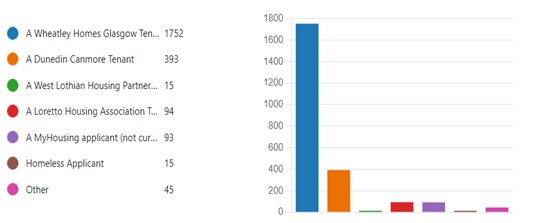Consultations
We are always keen to hear your views on our services.

Check out our latest consultations below. Remember, we're always keen to hear your views all year round. Find out how to get in touch with us on our Contact us page.
Rent setting 2023/24
All tenants, with the exception of those in ex Cube Housing Association homes, were consulted on three options: 3.9%; 4.4% and 4.9%. The consultation brochure set out what each option would mean for services and investment.
Tenants who live in ex-Cube Housing Association homes transferred through the stock transfer ballot were consulted on a 1% increase (in line with the 3-year ballot commitment), as well as additional 1.5% and 2% options.
The consultation was administered independently by Civica. Following the closure of the consultation the feedback was counted and verified by Civica. The results were as follows:
WHG results (excl. ex-Cube) | Ex-Cube results | ||
|---|---|---|---|
Rent options | Responses | Rent options | Responses |
3.9% | 3500 (72%) | 1% | 247 (69%) |
4.4% | 671 (14%) | 1.5% | 64 (18%) |
4.9% | 697 (14%) | 2% | 45 (13%) |
4868 | 356 | ||
The consultation saw the highest ever response rate on record from tenants, with over 5200 valid responses received.
The results of the consultation were reviewed by the Wheatley Homes Glasgow Board who approved an increase of 3.9% (excl. former Cube) and 1% for tenants in former Cube Homes.
These increases are far less than the current rate of inflation, at 10.1%, and well below the anticipated Scottish national average increase of 6.1% for Registered Social Landlords.
Focus group responses
The consultation followed our pre consultation focus groups. Read about the findings and key issues from the focus groups in our BMG report.
Our rent consultation and the focus groups provided us with a range of valuable feedback on key priorities and issues for tenants. We are responding to that feedback in a number of ways:
Repairs
Tenants reiterated that repairs being completed right first time and communication, especially for follow on repairs, remain key priorities.
We have responded to this feedback by:
- creating a new specialist team co-located with City Building who will be responsible for coordinating more complex jobs and keeping tenants informed throughout the process;
- for complex repairs a single point of contact for the tenant who will coordinate all communication and appointments directly with the tenant;
- set up a dedicated damp and mould team with the objective to respond to any reports of damp or mould within 48 hours;
- increasing the number of repairs specialists at our Customer First Centre;
- accelerating plans to introduce Book It, Track It, Rate it for repairs. This will launch over the course of this year and as part of this tenants will receive:
- text message reminding tenants of upcoming appointment the day before
- live updates on the day of appointment
- real time tracking information of the repairs operative and how close they are to arriving
- an option to provide immediate feedback on the service and quality of repair post appointment
- the option to request a call back to discuss the service.
Repairs satisfaction has been improving, with satisfaction at over 89% for the last three months and less than 1% of repairs undertaken lead to a complaint.
Customer First Centre/Local community presence
Tenants affirmed that a fast response when calling the Customer First Centre coupled with a visible presence in communities remain priorities. We have enhanced the number of staff in our Customer First Centre to both answer calls quicker and also free up Housing Officers to spend even more time in communities.
Since November we have visited nearly 50% of tenants in their homes. We have also put in place a renewed programme of annual visits for tenants which will include us undertaking a check for any property condition issues, particularly those which could cause dampness or mould.
Anti-social behaviour
The majority of anti-social behaviour cases we receive relate to noise complaints. We have commenced the roll out of a noise app which allows us to better monitor and record instances of noise related anti social behaviour. This allows us to take action quicker, including having the necessary evidence to refer cases for enforcement action.
Outcome of Allocations Policy review
Wheatley Group landlords consulted customers on three proposed changes to the existing Housing Information Advice and Letting Policy Framework, following recommendations from an independent review commissioned in 2021. The consultation took place over a six-week period during June and July 2022.
Throughout the consultation period, over 71,000 consultation documents were sent to customers with links and QR codes to an online survey. There was also an option for customers to receive a hard copy of the survey if needed There was a six-week social media campaign, with 43 posts on Facebook and Instagram reaching over 41,000 people. Links to the survey were also added to the Wheatley Group website and all subsidiary websites.
Wheatley Group held 13 customer focus groups, both online and face-to-face. A total of 235 customers booked on to these sessions. Customers who preferred not to participate were also offered individual phone calls.
A total of 2455 customers from all categories responded to the anonymous online survey. The breakdown of those completing the survey was:

The survey was made up of 25 questions based on the recommendations from an independent review commissioned in 2021. There were three key questions:
- We have homes in 19 local authority areas, do you think we should have the ability to reflect circumstances in local areas where this would support localised housing need?
- During the pandemic we moved to a new process for homeless applicants, where we worked with local authorities to provide a streamlined service for our most vulnerable applicants. You told us during the review last year this new process was working well. We plan to continue with this service providing additional support for our most vulnerable applicants, do you agree with this?
- As part of the review last year, you told us that Band E has too many different types of applicants. Do you think we should separate our properties with an age restriction (i.e Livingwell) into a separate band?
The response from those who expressed an opinion:
| Question | Response |
|---|---|
| Matching homeless customers | 86% agree |
| Ensuring we have flexibility to meet local needs across local authorities | 96% agree |
| Livingwell to move to its own band | 91% agree |
Stakeholder responses
Wheatley Group contacted over 50 stakeholders, local authorities and Registered Tenant Organisations with a separate consultation. Four stakeholders responded to the survey, two were from local authorities, one from RTO and the other from a housing advice charity.
| Question | Agree | Disagree | Neither agree or disagree |
|---|---|---|---|
| Matching homeless customers | 4 | ||
| Ensuring we have flexibility to meet local needs across local authorities | 4 | ||
| Livingwell to move to its own band | 3 | 1 |
Next steps
All comments were analysed and the Housing Information Advice and Letting Policy and Framework updated to reflect the outcome of the consultation. An updated framework was presented to Wheatley Group Board for approval in August 2022 and RSL subsidiary boards in September 2022.
The new Housing Information Advice and Letting Policy and Framework will formally launch in Spring 2023.
Guide to consultations
We’re always keen to hear your views on our services and how we can get better. One way we do this is by carrying out consultations.
All of our consultations follow these seven principles:
- Integrity – each consultation has an honest intention, that we will listen to and be influenced by what our tenants tell us
- Visibility – affected tenants and other affected stakeholders are reasonably aware of the consultation
- Accessibility – affected tenants and affected other stakeholders have reasonable access to the consultation. We will use digital means of ensuring access to consultations where appropriate
- Transparency – it is clear when the consultation closes, who is collating the responses and whether responses will be published
- Disclosure – any appropriate information applicable to the consultation is made available
- Fair interpretation – consultation responses will be collated and analysed objectively
- Publication – it is made clear of where and when the consultation report will be available.